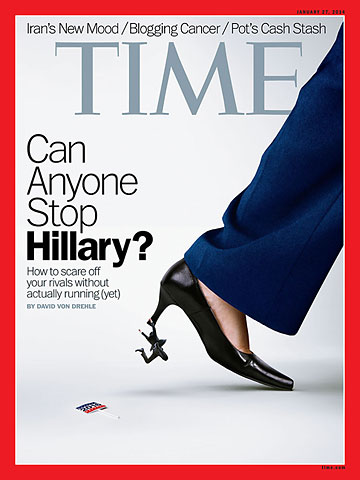
(3 of 7)
The Gravity
When Clinton's Press Secretary Nick Merrill recently answered some questions from TIME about his boss's plans by declaring in an email that "there is no candidate, there is no campaign," I found myself flashing on the image of a black hole--the astrophysical phenomenon that manages to be both invisible and superpowerful at the same time. Scientists confirm the presence of a black hole by measuring its effects on nearby stars as it bends their orbits and heats the gases swirling in its galactic vicinity.
The existence of Clinton's 2016 campaign cannot be directly observed through a formal announcement ritual or by linking to documents at the Federal Election Commission. But its massive influence on the stars and gases of Washington is unmistakable. Most of her fellow Democrats are signaling scant interest in taking her on. Massachusetts Senator Elizabeth Warren, a hero of the left, has repeatedly said she would not challenge Clinton in the primary. Likewise, Senators Kirsten Gillibrand of New York and Amy Klobuchar of Minnesota--who might otherwise vie to be the first female President--have said they would support her candidacy. "I think if another woman ran against Hillary, she would bring down the wrath of women around the country," said one veteran Democratic strategist, echoing a widespread view inside the party that Clinton earned another shot at history when she surrendered gracefully to Barack Obama in 2008.
Vice President Joe Biden would love to run, though he would be 74 by Inauguration Day and past donors and former staff report that he sees little room for himself in a field with Clinton. Ambitious governors like Martin O'Malley of Maryland, Andrew Cuomo of New York and Deval Patrick of Massachusetts are young enough to wait another cycle or two. To find a Democrat openly courting the race you have to visit the unlikely terrain of Big Sky Country, where former Montana governor Brian Schweitzer has been enjoying a minor burst of publicity as he flirts with a dark-horse challenge.
This dearth of competition--which could change if Clinton were suddenly, somehow, to appear vulnerable--is a testament to her immense pull inside the Democratic electorate, which is disproportionately female. She has cleared the field of major challengers despite the fact that the party's left wing has serious reservations about her centrist record and gilded connections. In addition to Clinton's fierce detractors on the right, progressive Democrats tend to see her as a hawk on foreign affairs and an enabler of Big Business. Despite this antipathy, however, no fresh figure has emerged to pick up the banner of the left. At this point, only a cantankerous Vermonter, Bernie Sanders, has shown much appetite for the race--and Sanders, a self-described socialist Senator, will have to switch parties if he wants to challenge her in the primaries.
